Dallas Police Lee Harvey Oswald Interview Interrogation Friday JFK Assassination: |
| THE GRAND SUBVERSION, OSWALD INTERROGATION PG. ( 1 OF 3 ) SITE MAP - VIEW ALL SECTIONS |
|
[
HOME ] |
Dallas Police Department Lee Harvey Oswald Interview Interrogation statements, jfk assassination.
Capt.
J. Will Fritz.
Mr. FRITZ. The nearest that I have here then would be shortly after 2:15 p.m.
Mr. BALL.
You will notice that Sims and Boyd make it, state they brought him
from the conference room to your office at about 2:20.
***
Mr. BALL. Who was present when you talked with him?
Mr. FRITZ.
At that time, when I first brought him in there there would be
Sims and Boyd and probably one or two officers from the office, I am not sure,
just who else might have been there. I know those two, I am sure, I believe
those two were there. Just about the time I started talking to him, I had just
started to question him, I got a phone call from Mr. Shanklin, Gordon Shanklin,
agent in charge of the FBI calling for Mr. Bookhout, and I asked Mr. Bookhout to
go to pick up the extension.
Mr. BALL. Was Mr. Bookhout there?
Mr. FRITZ. He had just come into the lieutenant's office and
Mr. Shanklin
asked that Mr. Hosty be in on that questioning,
he said he wanted him in there
because of Mr. Hosty knowing these people and he had been talking to them and he
wanted him in there right then.So, I got up from my desk and walked over to the lieutenant's office and
asked Mr. Bookhout to come in, the reason I asked both of them to come in and
Mr. Bookhout is in my office most of every day and works with us in a lot of
cases and asked him to come in with Mr. Hosty.
***
Mr. BALL.
Do you remember what you said to Oswald and what he said to you?
Mr. FRITZ. I can remember the thing that I said to him and what he said to
me, but I will have trouble telling you which period of questioning those
questions were in because
I kept no notes at the time, and these notes and
things that I have made I would have to make several days later, and the
questions may be in the wrong place.
Mr. BALL. What is your best memory of what you said to him when he first came
in?
Mr. FRITZ. I first asked him as I do of most people something about where he
was from, and where he was raised and his education, and I asked him where he
went to school and he told me he went to school in New York for a while, he had
gone to school in Fort Worth some, that he didn't finish high school, that he
went to the Marines, and the Marines, and finished high school training in the
Marines.
And I don't remember just what else.
I asked him just the general questions
for getting acquainted with him, and so I would see about how to talk to him, and Mr. Hosty spoke up and asked him something about Russia, and asked him if he
had been to Russia, and he asked him if he had been to Mexico City, and this
irritated Oswald a great deal and he beat on the desk and went into a kind of a
tantrum.
Mr. BALL.
What did he say when he was asked if he had been to Mexico City?
Mr. FRITZ.
He said he had not been. He did say he had been to Russia, he was
in Russia, I believe he said for some time.
***
Mr. BALL. Was there anything said about Oswald's wife?
Mr. FRITZ.
Yes, sir. He said, he told Hosty, he said, "I know you." He said,
"You accosted my wife on two occasions," and he was getting pretty irritable and
so I wanted to quiet him down a little bit because I noticed if I talked to him
in a cairn, easy manner it wasn't very hard to get him to settle down, and I
asked him what he meant by accosting, I thought maybe he meant some physical
abuse or something and he said, "Well, he threatened her." And he said, "He
practically told her she would have to go back to Russia." And he said, "He
accosted her on two different occasions."
***
Mr. FRITZ. And I asked him about that arrangement and I am again, I can't be
too sure when this question was asked. I asked him why his wife was living in
Irving and why he was living on Beckley and he said she was living with Mrs.
Paine. Mrs. Paine was trying to learn to speak Russian and that his wife, Mrs.
Oswald, had a small baby and Mrs. Paine helped with the baby and his wife taught
Mrs. Paine Russian and it made a good arrangement for both of them and he stayed
over in town.
I thought it was kind of an awkward arrangement and I questioned
him about the arrangement a little bit and I asked him how often he went out
there and he said weekends. I asked him why he didn't stay out there. He said he didn't want to stay out
there all the time, Mrs. Paine and her husband didn't get along too well. They
were separated a good part of the time and I asked him if he had a car and he
said he didn't have a car, he said the Paines had two ears but he didn't use
their cars
***
Mr. FRITZ.
Well, I sent them out there real soon and Officer Potts called me
back from out there and talked to me on the telephone and gave me a report from
out there on the telephone, and I am sure that that is the time that he told me
about the way he was registered, and I asked Oswald about why he was registered
under this other name.
Mr. BALL. What other name?
Mr. FRITZ. Of O. L. Lee.
Mr. BALL. O. H. Lee?
Mr. FRITZ.
O. H. Lee. He said, well, the lady didn't understand him, she put
it down there and he just left it that way.
***
Mr. BALL.
Did you have any tape recorder?
Mr. FRITZ.
No, sir; I don't have a tape recorder. We need one, if we had one
at this time we could have handled these conversations far better.
Mr. BALL. The Dallas Police Department doesn't have one?
Mr. FRITZ. No, sir; I have requested one several times but so far they
haven't gotten me one.
Lee Harvey Oswald Interview Interrogation Dallas
Police Department.
Detective
Richard Stovall
Mr. BALL. You went to work at 2 o'clock?
Mr. STOVALL. Well, I was scheduled to go to work at 4 that day, I believe, but
as soon as I heard that I got cleaned up and got ready for work and went on in.
Mr. BALL. Were you given an assignment as soon as you got down there?
Mr. STOVALL. No, sir; I wasn't--as soon as I got there. I got there and one of
my partners, G. F. Rose, got there about the same time. We were talking to a
witness that had seen all the people standing out there--he didn't actually see
anything, so we didn't even take an affidavit from him because he didn't see
anything. While talking to him, the officers brought Lee Harvey Oswald into the
Homicide Bureau and put him into an interrogation room we have there at the
bureau. After we finished talking to this witness, we went back there and talked
to him briefly.
Mr. BALL.
Do you remember what was said to him and what he said to you?
Mr. STOVALL.
I don't recall exactly--I went in and asked him for his
identification, asked him who he was and he said his name was Lee Oswald, as
well as I remember. Rose and I were both in there at the time. He had his
billfold and in it he had the identification of "A. Hidell," which was on a
selective service card, as well as I remember.
Mr. BALL. That's [spelling] H-i-d-e-l-l, isn't it?.
Mr. STOVALL. I'm not positive on that--I believe it was [spelling] H-i-d-e-l-l,
I'm not sure. And he also had identification of Lee Harvey Oswald, and I believe
that was on a Social Security card and at that time
Detective
Guy
Rose
Mr. ROSE. No; I came in just as soon as I heard of the shooting--I came on to
work.
Mr. BALL. Where did you go to work?
Mr. ROSE. I reported to the homicide office. It's room 317 at the city hall.
Mr. BALL. Where did you go then?
Mr. ROSE. There were some people in the office from the Book Depository and we
talked to a few of them and then in just a few minutes they brought in Lee
Oswald and I talked to him for a few minutes?
Mr. BALL. What did you say to him or did he say to you?
Mr. ROSE.
Well, the first thing I asked him was what his name was and he told me
it was Hidell.
Mr. BALL.
Did he tell you it was Hidell?
Mr. ROSE.
Yes; he did.
Mr. BALL.
He didn't tell you it was Oswald?
Mr. ROSE.
No; he didn't, not right then--he did later. In a minute--I found two
cards--I found a card that said "A. Hidell." And I found another card that said
"Lee Oswald" on it,
and I asked him which of the two was his correct name. He
wouldn't tell me at the time,
he just said, "You find out."
And then in just a
few minutes Captain Fritz came in and he told me to get two men and go to Irving
and search his house.
Mr. BALL. Now, when he first came in there--you said that he said his name was "Hidell"?
Mr. ROSE. Yes.
Mr. BALL. Was that before you saw the two cards?
Mr. ROSE. Yes; it was.
Mr. BALL. Did he give you his first name?
Mr. ROSE. He just said "Hidell"; I remember he just gave me the last name of "Hidell".
Mr. BALL. And then you found two or three cards on him?
Mr. ROSE. Yes; we did.
Mr. BALL. Did you search him?
Mr. ROSE. He had already been searched and someone had his billfold. I don't
know whether it was the patrolman who brought him in that had it or not.
Mr. BALL. And the contents of the billfold supposedly were before you?
Mr. ROSE. Yes.
Mr. BALL. Were you sitting down?
Mr. ROSE. No; I was standing in the interrogation room.
Mr. BALL. Where was he--was he standing too?
Mr. ROSE. No; he was sitting in the chair.
Mr. BALL. Was he handcuffed?
Mr. ROSE. Yes; he was.
Mr. BALL. Were the handcuffs behind or in front of him?
Mr. ROSE. I believe they were behind him--I don't remember for sure.
Mr. BALL. Who else was present at that time?
Mr. ROSE. Detective Stovall, he was my partner, and I believe both uniformed men
were present--two of the uniformed men were present.
Mr. BALL. The ones who brought him in?
Mr. ROSE. Yes.
Mr. BALL. Do you know their names?
Mr. ROSE. I don't remember--I did see McDonald and I did talk to him, but I
don't remember whether he was the one that was standing right there at the time
or not.
Mr. BALL. After you saw the cards, you asked him which one was his true name?
Mr. ROSE. Yes; I did.
Mr. BALL. What did he say?
Mr. ROSE. He said, "You find out."
Mr. BALL. Did you ask him what his address was?
Mr. ROSE. Yes; but from there, he wouldn't tell me--he just said, "You just find
out."
Mr. BALL. Now, did anybody ever tell you that his address was 1026 North
Beckley?
Mr. ROSE. Later they did--right then they didn't; no, sir.
Mr. BALL. You didn't know it at that time?
Mr. ROSE. No, sir; I didn't.
Mr. BALL. How soon after that did you go out to Irving--to the Irving Street
address?
FBI
James W. Bookhout,
Mr. BOOKHOUT - I was not in the office at that time. I called our office,
advised them he had been brought in, and that the interview was starting and
shortly thereafter Mr. Shanklin, our SAC called back and said
the Bureau wanted
the agents present in the interview and that Hosty, James P. Hosty, I believe
was ,to sit in on the interview, and I was to also be present with Hosty. So, at
that time, we asked Captain Fritz to sit in on the interview, and that was
approximately 3:15 p.m.
Mr. STERN - How long had the interview gone on before you were present?
Mr. BOOKHOUT - Very shortly. I would give a rough estimate of not more than 5 to
10 minutes at the most.
Mr. STERN -
How long did that first interview last?
Mr. BOOKHOUT - A little under an hour.
Mr. STERN - Was it interrupted at any point, if you remember?
Mr. BOOKHOUT - Well, what I am thinking, we have got several interviews here. I
know from time to time I can't recall whether it was this interview, or
subsequent interviews Captain Fritz would have to leave the office for a second
or two. By "office," I mean the immediate office that the interview was being
conducted in, but still within the homicide and robbery office.
Mr. STERN - Did the interviewing continue when he was out of the room, or did
you wait for his return?
Mr. BOOKHOUT - No; it would continue.
Mr. STERN - By whom was the interview conducted?
Mr. BOOKHOUT - Primarily it was conducted by Captain Fritz and then before he
would leave from one point to another he would ask if there was anything we
wanted to ask him particularly on that point.
Mr. STERN - By "we," you mean Agent Hosty and yourself?
Mr. BOOKHOUT - Right.
Mr. STERN - What was Oswald's demeanor in the course of this interview? Did he
seem in control of himself, excited, or calm? Can you describe his conduct?
Mr. BOOKHOUT -
He was very arrogant and argumentative. That is about the extent
of the comment on that.
Mr. STERN - Is this as to you and Hosty, or also Captain Fritz? Did he
differentiate in his conduct between Captain Fritz and the two of you?
Mr. BOOKHOUT - Now--no; that would apply to everyone present.
Mr. STERN -
Did he answer all questions put to him or did he refuse to answer
the questions?
Mr. BOOKHOUT - No; there would be certain questions that he refused to comment
about.
Mr. STERN - When this happened was the question pressed, or another question
asked?
Mr. BOOKHOUT - Anyone asking the another question would be asked.
Mr. STERN - What sort of question would he refuse to answer? Was there any
pattern to his refusing?
Mr. BOOKHOUT - Well, now, I am not certain whether this would apply then to this
particular interview, the first interview or not, in answering this, but I
recall specifically one of the interviews asking him about the Selective Service
card which he had in the name of Hidell, and he admitted that he was carrying
the card, but that he would not admit that he wrote the signature of Hidell on
the card,
and at that point stated that he refused to discuss the matter
further. I think generally you might say
anytime that you asked a question that
would be pertinent to the investigation, that would be the type of question he
would refuse to discuss.
***
Mr. STERN -
Did he, at that point, or later say anything specifically regarding
the FBI?
Mr. BOOKHOUT - Yes.
Mr. STERN - Tell us what that was.
Mr. BOOKHOUT -
He accused the FBI of, generally, unfair tactics in inter viewing
his wife on some previous occasion.
Mr. STERN - Was this directed specifically at either you or Hosty, or to the
general----
Mr. BOOKHOUT -
It was directed against Hosty.
Mr. STERN - He did not, Oswald did not indicate that he knew Hosty himself, did
he?
Mr. BOOKHOUT - No.
Mr. STERN - But, there was a complaint about an interview, or interrogation of
Marina Oswald?
Mr. BOOKHOUT - Right.
Mr. STERN - Did he say anything about FBI interviews of him that had occurred in
the past, any complaint about such interviews?
Mr. BOOKHOUT - I don't know that that would be in this particular interview,
but
in one of the interviews which has been reported he stated that he had been
interviewed at Fort Worth, Tex., by agents upon his return to the United States
from Russia, and he felt that they had used unfair means of interviewing him, or
something. Those are not his exact words, but that is the impression he
conveyed.
Mr. STERN - Unfair in what respect?
Mr. BOOKHOUT - I don't know.
***
Mr. STERN - Yes. Did he indicate that he felt that the interview that was then
going on was unfair in any way? Did he complain about that?
Mr. BOOKHOUT - No, he didn't complain about the interview. He made a complaint
or two, as I recall, that one of the interviews that has been reported, in fact,
I believe it was in this first interview he complained about his hands being
handcuffed behind his back, and asked Captain Fritz to remove the handcuffs.
Captain Fritz had one of his officers uncuff his hands from behind his back and
recuff them in front and asked him if that was more satisfactory and he stated
that it was.
Mr. STERN -
Any other aspect of his treatment that he complained of?
Mr. BOOKHOUT - I recall one of the interviews that
he complained about the
lineup that he was in, that he wasn't allowed to wear a jacket similar to
jackets worn by others in the lineup.
Mr. STERN - Did this occur at the lineup or subsequently?
Mr. BOOKHOUT - This was in one of the interviews in Captain Fritz' office.
Mr. STERN - Referring to a lineup that had----
Mr. BOOKHOUT - Subsequently been held--previously been held.
Mr. STERN -
During the first interview was he asked whether he had ever been in
Mexico, and if so, by whom?
Mr. BOOKHOUT - Yes;
I recall Hosty asking him if He had ever been in Mexico.
Mr. STERN - What did he say?
Mr. BOOKHOUT -
He said he had not. I believe he mentioned he had been in
Tijuana, Mexico, I believe, but I believe the question was whether he had ever
been in Mexico City.
Mr. STERN -
Was he asked about an organization called the Fair Play for Cuba
Committee, and if so, by whom?
Mr. BOOKHOUT - Yes, he was asked if he belonged to that. I don't recall
specifically who raised the question.
Mr. STERN - What did he say?
Mr. BOOKHOUT -
He said he was a member of it, and was secretary of the New
Orleans branch. I believe he said the headquarters was in New York City.
Mr. STERN - Was there much discussion of this, or just the identification?
Mr. BOOKHOUT - Well, now, that is another instance where he balked on answering
a question. He was asked who the officers were, and at that point he said he
refused to discuss the matter further.
Mr. STERN -
Was he asked his residence address in Dallas and did he give it?
Mr. BOOKHOUT -
Yes; he furnished the address of 1026 North Beckley.
Mr. STERN - Did he say that he was living there under another name, or was
another name and particularly the name O. H. Lee mentioned at all in this
connection?
Mr. BOOKHOUT -
He was asked why he was using the name Lee at this address, and
he attempted to pass it off by stating that the landlord was an old lady, and
his first name was Lee and she just had gotten it in her head that he was Mr.
Lee. He never did explain about the initials O. H.
Mr. STERN -
Was he asked whether he had shot the President, or Officer Tippit?
Mr. BOOKHOUT - Yes; he was asked that, and
denied shooting either one of them,
or knowing anything about it.
Mr. STERN - Was he asked whether he was carrying a pistol at the time he was in
the Texas Theatre?
Mr. BOOKHOUT - Yes; that was brought up.
He admitted that he was carrying a
pistol at the time he was arrested. He claimed that he had bought this some time
ago in Fort Worth.
Mr. STERN -
He said he had gotten it in Fort Worth?
Mr. BOOKHOUT - That is my recollection, and there again, in trying to follow
through on that line of thought, he refused to answer any further questions as
to whereabouts in Fort Worth he had bought it.
Mr. STERN - Did he talk about his arrest and his resistance of arrest at the
Texas Theatre?
Mr. BOOKHOUT - He admitted fighting with the officer at the time of the arrest,
but I don't recall any explanation as to why he was doing it.
Mr. STERN - Did he admit that he might have been wrong in doing that, or say
anything to that effect?
Mr. BOOKHOUT -
Seemed to me like he made the comment that the only thing he was
guilty of, or the only thing he could be charged with would be the carrying of a
concealed weapon, and of resisting the arrest.
Mr. STERN -
When he was asked about involvement in the assassination of
President Kennedy, or the shooting of Officer Tippit, how would you describe his
denials?
Mr. BOOKHOUT - Well, I don't know exactly how to describe it, but as I recall,
he spoke very loudly. In other words, he was--he gave an emphatic denial, that
is about all I can recall on it.
***
Mr. BOOKHOUT - No; he wouldn't use the same expression of speech in answering
all questions. He would have certain kinds there, and certain types of questions
that he would apparently have stronger feelings on.
Mr. STERN - Do you recall at any time his pounding on the desk, or making any
other physical gestures of that kind?
Mr. BOOKHOUT - I don't recall him pounding on the desk; no, sir.
***
Mr. STERN - Your normal practice is to get times down pretty accurately in
matter of this----
Mr. BOOKHOUT - Try to.
Mr. STERN - And did you make the record of these times, or did Agent Hosty?
Mr. BOOKHOUT - I Can say that I did. Whether he did or not, I don't know.
Mr. STERN -
Incidentally, normally, do you preserve those notes or destroy them
when you make a formal report?
Mr. BOOKHOUT -
They will be, normally, destroyed at the time you make your--what
we refer to as an interview report.
Mr. STERN -
And in this case, did you destroy your notes?
Mr. BOOKHOUT -
That's correct.
Mr. STERN -
So, you have no notes respecting this
whole matter?
Mr. BOOKHOUT -
No, other than the reported interviewing report.
Interview Interrogation Lee Harvey Oswald Dallas
Police Department.
FBI.
James Patrick Hosty, Jr.
Mr. STERN.
What happened next?
Mr. HOSTY. As I said, I left Lieutenant Revill. I entered the office of Capt.
Will Fritz. After a short delay, Agent James W. Bookhout and myself entered the
inner office of Capt. Will Fritz of the homicide section, Dallas Police
Department, where Lee Harvey Oswald was being questioned.
Mr. STERN. I show you a two-page document marked Commission No. 832 for
identification. Can you identify that?
Mr. HOSTY.
Yes, sir. This is an interview form which I made for my interview
with Lee Harvey Oswald on the 22d of November 1963. It was dictated as the form
will indicate, on the 23d of November 1963.
Mr. STERN. Let me ask you there, Mr. Hosty, about your practice in reducing to
formal form your notes of interviews. This happened the next day?
Mr. HOSTY. Right.
Mr. STERN. Is that faster than usual because of the circumstances?
Mr. HOSTY. Because of the circumstances..We have to reduce them to writing
within 5 days.
Mr. STERN. In 5 days?
Mr. HOSTY. Five working days.
Mr. STERN. Did you retain the notes of this?
Mr. HASTY. No. After the interview is reduced to writing, I get it back and
proofread it. My notes are then destroyed because this is the record.
Mr. STERN. And in this particular instance did you destroy your notes of this?
Mr. HOSTY. Yes, sir.
Mr. STERN. Now you say that you are required to reduce your notes of an
interview to writing within 5 working days.
Mr. HOSTY. Right.
Mr. STERN. Did that happen with respect to the interviews you conducted on
October 29, November 1, and November 5?
Mr. HOSTY. To make this a little clearer, this would be an interview of a
subject, not of a witness, unless this witness has something that was quite
pertinent to the investigation.
Routine-type matters do not have to be put on these interview forms, but
pertinent interviews would be. Now everything in this case after the
assassination was declared to be pertinent. All interviews, regardless of how
insignificant, were to be put on these forms.
Mr. STERN. But the interviews you conducted at the beginning of November and the
end of October were not within this rule?
Mr. HOSTY. No; because they were not an interview of the subject or anything
that contained anything of major importance.
Mr. STERN. Do you yourself destroy the notes?
Mr. HOSTY. Yes.
Mr. STERN
Do you recall specifically destroying the notes of your interview?
Mr. HOSTY. Yes, sir; in the wastebasket.
Mr. STERN.
Your interview of Oswald, on November 22, you put the notes in the
wastebasket?
Mr. HOSTY.
Right..
Mr. STERN. Do you recall specifically what you did with the notes of your
interviews of October 29, November 1, and November 5?
Mr. HOSTY. After I reduced them to writing, such as I did here, and I got the
form back, I proofread it, then I threw them away.
Mr. STERN. And you testified that the notes of your end of October early
November interviews were transcribed after November 22, is that correct?
Mr. HOSTY. Right
Mr. STERN. Were the notes destroyed after you transcribed those interviews, also
after November 22?
Mr. HOSTY. Yes.
Mr. STERN.
Did you give any consideration to retaining the notes in view of the
turn that the case had taken?
Mr. HOSTY.
No.
Mr. STERN. The intervening assassination?
Mr. HOSTY. No; because this is the record and the notes would not be as good as
this record, because the notes are not written out fully as this is. It would
just be abbreviations and things of that type.
Mr. STERN.
And you received no instructions about retaining notes?
Mr. HOSTY.
No; we had no instructions.
We were following the same rule we had
always followed.
Mr. STERN
Why don't you tell us now, turning to your memorandum of the November
22 interview of Lee Harvey Oswald, what transpired from the time you first
entered Captain Fritz' office.
Mr. HOSTY. As this interview form will show, the interview commenced at 3:15
p.m. I am certain of that time because I checked my wristwatch, and Agent
Bookhout checked my wristwatch.
We both agreed on the time, 3:15.
We came in and
identified ourselves as agents of the FBI. I told Oswald my name and he reacted
violently.
Mr. STERN. How do you mean?
Mr. HOSTY.
To both Agent Bookhout and myself. He adopted an extremely hostile
attitude towards the FBI.
Mr. STERN.
Was it the FBI or the name Hosty?
Mr. HOSTY.
Both. He reacted to the fact that we were FBI, and he made the remark
to me, "Oh,. so you are Hosty. I've heard about you."
He then started to cuss at us, and so forth, and I tried to talk to him to calm
him down. The more I talked to him the worse he got, so I just stopped talking
to him, just sat back in the corner and pretty soon he stopped his ranting and
raving.
Mr. STERN.
What was he saying? Please be specific.
Mr. HOSTY.
Well, he said, "I am going to fix you FBI," and he made some
derogatory remarks about the Director and about FBI agents in general. I don't
specifically recall the exact wording he used.
Representative FORD. Had this been the attitude that existed prior to you and
Bookhout coming into the----
Mr. HOSTY. Apparently not; apparently not. I couldn't say because I wasn't in
the room. We walked into the room. I immediately identified myself, told him I
was with the FBI, and was a law-enforcement officer, and anything he said to me
could be used against him. He did not have to talk to us.
Senator COOPER Can you describe the tone of his voice and his manner?
Mr. HOSTY. I beg your pardon, sir?
Senator COOPER. Can you describe the tone of his voice?
Mr. HOSTY.
He was highly excited. He was very surly, I think would be about the
best way to describe him, very surly; and he was curt in his answers to us,
snarled at us. That would be his general attitude.
Representative FORD. Did he use profanity?
Mr. HOSTY. Yes, sir. I can't recall any specific statements he made, however.
Mr. McCLOY.
Did he complain that you had been abusing or harassing his wife in
anyway?
Mr. HOSTY.
He made the statement, "If you want to talk to me don't bother my
wife. Come and see me." He didn't say that I had abused his wife in any manner,
and I hadn't. He did criticize me for talking to her. He said, "Come talk to me
if you want to talk to me."
Representative
FORD. Is that why he knew your name, because of your
conversations with her?
Mr. HOSTY.
Yes; apparently.
Mr. STERN.
Had you ever seen Oswald before?
Mr. HOSTY.
Not until that time. That was the first time I had seen him.
Senator COOPER. Can you remember what he said about the FBI specifically?
Mr. HOSTY.
He called us gestapo, secret police, we were harassing people. It was
along that line. I don't recall the exact wording.
Mr. STERN. Was he handcuffed at this time?
Mr. HOSTY. He was handcuffed behind him. After he calmed down he asked Captain
Fritz if they could remove the handcuffs. Captain Fritz ordered one of his
detectives to remove them from the rear, and they handcuffed him in front.
Mr. STERN. This happened right after you came into the room?
Mr. HOSTY. Shortly after we came in the room.
Mr. STERN. Before or after his outburst?
Mr. HOSTY. After his outburst; after he had calmed down.
Mr. STERN. Please continue.
Mr. HOSTY. Captain Fritz actually conducted the interview.
Agent Bookhout and
myself sat back in the corner
and observed.
Captain Fritz asked Oswald if he had
ever owned the rifle. He denied
he had ever owned a rifle. He said that he had seen the superintendent of the
School Book Depository with a rifle in his office a couple of days before the
assassination, but that he had never had a rifle in the building. He then told
Captain Fritz that he had been to the Soviet Union and resided there for 3
years, and he had many friends in the Soviet Union. Captain Fritz then showed
him a piece of paper which had "Fair Play for Cuba" on it, and Oswald admitted
to Captain Fritz that he was secretary for the Fair Play for Cuba Committee in
New Orleans a few months ago.
He told Captain Fritz that the Fair Play for Cuba Committee had its headquarters
in New York City. Captain Fritz then showed Oswald a marksman's medal from the
Marine Corps, and Oswald admitted that this was his medal, that he had received
a sharpshooter's medal while in the Marine Corps.
Mr. McCLOY. Was it a sharpshooter's or a marksman's? There are two different
types, you know.
Mr. HOSTY. I believe it was a sharpshooter, sir.
He then told Captain Fritz that
he had been living at 1026 North Beckley, that is in Dallas, Tex., at 1026 North
Beckley under the name O. H. Lee and not under his true name.
Oswald admitted that he was present in the Texas School Book Depository Building
on the 22d of November 1963, where he had been employed since the 15th of
October. Oswald told Captain Fritz that he was a laborer in this building and
had access to the entire building. It had offices on the first and second floors
with storage on third, fourth, fifth and sixth floors.
Oswald told Captain Fritz that he went to lunch at approximately noon on
the 22d of November, ate his lunch in the lunchroom, and had gone and gotten a
Coca Cola from the Coca Cola machine to have with his lunch. He claimed that he
was in the lunchroom at the time President Kennedy passed the building.
He was asked why he left the School Book Depository that day, and he stated that
in all the confusion he was certain that there would be no more work for the
rest of the day, that everybody was too upset, there was too much confusion, so
he just decided that there would be no work for the rest of the day and so he
went home. He got on a bus and went home. He went to his residence on North
Beckley, changed his clothes, and then went to a movie.
Captain Fritz asked him if he always carried a pistol when he went to the movie,
and he said he carried it because he felt like it. He admitted that he did have
a pistol on him at the time of his arrest, in this theatre, in the Oak Cliff
area of Dallas. He further admitted that he had resisted arrest and had received
a bump and a cut as a result of his resisting of arrest. He then denied that he
had killed Officer Tippit or President Kennedy.
Mr. STERN. The memorandum says, "Oswald frantically denied shooting"
Mr. HOSTY. It should be emphatically, I believe, rather than frantically. I
think this probably should be "emphatically denied."
Mr. STERN. Is this your memorandum?
Mr. HOSTY. Yes, sir.
Mr. STERN It is signed or initialed both by you and by Mr. Bookhout.
Mr. HOSTY. Right. The procedure is that when there are two agents involved, they
both must approve it, so there can be no discrepancies.
Mr. STERN. But you dictated it.
Mr. HOSTY. I dictated it and he read it and we both approved it.
Mr. STERN. Have you been over it recently in preparation for your testimony?
Mr. HOSTY. Yes, sir.
Mr. STERN. Is it accurate? Is there anything you would like to add to it?
Mr. HOSTY. I think it is correct as it stands.
Mr. McCLOY. I didn't hear you repeating your testimony that he denied ever
having been in Mexico.
Mr. HOSTY.
Oh, yes; he was being questioned about his activities outside or the
United States, where he had been outside of the United States. He told Captain
Fritz that he had only been to Mexico to visit at Tijuana on the border, and
then he did admit having been in Russia.
Mr. McCLOY.
He only admitted to having been at Tijuana in Mexico?
Mr. HOSTY. Right.
Mr. McCLOY.
Not to Mexico City.
Mr. HOSTY.
Not to Mexico City; that is right.
Representative FORD.
There was no recording made of this interrogation?
Mr. HOSTY.
No, sir; it was notes I took. Agent Bookhout and I took notes, and we
dictated from the notes the next day.
Mr. STERN.
Did you ask him any questions?
Mr. HOSTY.
No; like I say, he was acting in such a hostile condition towards us
that we did not. This was Captain Fritz' interview anyway. We were just sitting
in as observers.
Mr. STERN.
Did you tell Captain Fritz at this time any of the information you
had about Oswald, about his trip to Mexico, for example?
Mr. HOSTY.
No.
Mr. STERN.
About his being in touch with the Russian authorities seeking a visa?
Mr. HOSTY.
No.
Mr. STERN.
About his previous residence in the Soviet Union?
Mr. HOSTY.
Oswald himself told Captain Fritz of this. I didn't have to. Oswald
came right out and told him.
Mr. STERN.
About the affair in New Orleans and his arrest there?
Mr. HOSTY.
No.
Mr. STERN.
Did you subsequently tell Captain Fritz?
Mr. HOSTY. No; I didn't tell Captain Fritz; no.
Mr. STERN. Was any of this information provided to the Dallas police as far as
you know?
Mr. HOSTY. I provided it to Lieutenant Revill earlier, as I pointed out. He
would have been the person I would have furnished this information to as the
head of the intelligence section. He would be the logical and correct person to
give this information to.
Mr. STERN.
Was that the extent of your advice to the Dallas police?
Mr. HOSTY.
Right.
Mr. McCLOY.
Did you tell Chief Curry that you had a file?
Mr. HOSTY.
No, sir; I haven't talked to Chief Curry in several years. Of course
I don't deal with him too much on a chief level.
Mr. STERN.
Wouldn't it be difficult for Lieutenant Revill to have gotten this
information from you under the conditions that you described, running up the
stairway and the rest of it? Do you think he heard enough of this?
Mr. HOSTY.
Well, that is true, he might not have. But you see Oswald then
proceeded to tell himself, he told the police all this information, so there was
no point in me repeating it when he himself, Oswald, had furnished it directly
to the police.
Mr. McCLOY.
But you did tell Revill that you had a file on Oswald?
Mr. HOSTY.
No; I didn't tell him I had a file; no, sir.
Mr. McCLOY. You did not?
Mr. HOSTY. Just as I related here in the affidavit.
The CHAIRMAN.
Mr. Hosty, I think the answer to this question is implicit in your
testimony, but I would just like to ask it directly. Did you or anyone in the
FBI to your knowledge for compensation or in any manner whatsoever use Oswald as
an informant in any way, shape or form?
Mr. HOSTY. I have previously furnished a sworn affidavit to this Commission to
the effect that I had never seen or talked to Lee Harvey Oswald prior to the 22d
of November 1963. I had never made payments of any kind to him, and, in
addition, I had never made any attempt to develop him as an informant or source
of information. I have made a sworn affidavit to that effect.
The CHAIRMAN.
Your answer to my question then is "No."
Mr. HOSTY.
Correct.
Dallas Police Department Lee Harvey Oswald Interview Interrogation.
Secret Service
Forrest V. Sorrels
And I started talking to Oswald, started asking him some questions, and
he was
arrogant and a belligerent attitude about him.
And
he said to me, "I don't know who you fellows are, a bunch of cops."
And I said, "Well, I will tell you who I am. My name is Sorrels and
I am with
the United States Secret Service, and here is my commission book."
I held it out in front of him and he said, "I don't want to look at it."
And he held his head up and wouldn't look at it at all.
And he said, What am I
going to be charged with? Why am I being held here? Isn't someone supposed to
tell me what my rights are?"
I said, "Yes, I will tell you what your rights are. Your rights are the same as
that of any American citizen. You do not have to make a statement unless you
want to. You have the right to get an attorney."
"Aren't you supposed to get me an attorney?"
"No, I am not supposed to get you an attorney."
"Aren't you supposed go get me an attorney?"
I said, "No, I am not supposed to get you an attorney, because if I got you an
attorney, they would say I was probably getting a rakeoff on the fee," or words
to that effect, and kind of smiled and tried to break the ice a little bit
there.
I said, "You can have the telephone book and you can call anybody you want to."
I said, "I just want to ask you some questions. I am in on this investigation. I
just want to ask you some questions."
Mr. STERN - Was there anything further said about an attorney?
Mr. SORRELS - Not that I recall at that time. I don't recall anything further
said about an attorney.
I asked him where he worked. He told me worked at this
Book Depository. And as I recall it, I asked him what his address was and where
he was living, and he explained to me that he was living apart from his wife,
and that she was living over in Irving, Tex. I asked him, as I recall it, what
his duties were at this Book Depository, and he said filling orders. I asked him
if he had occasion to be on more than one floor, and he said, yes.
I asked him
if he had occasion to be on the sixth floor of the building. He said, yes,
because they fill orders from all the floors.
But he said most of his activity was down on the first floor.
And
I think I asked him whether or not he had ever been in a foreign country and
he said that he had traveled in Europe, but more time had been spent in the
Soviet Union, as I recall it.
And then he just said "I don't care to answer any more questions."
And so the conversation was terminated.
Mr. STERN - Did he give you his address?
Mr. SORRELS - As I recall it, he did give me an address. I don't remember what
it was offhand.
FBI
Manning C. Clements
I sought out Captain Fritz, in charge of the-homicide bureau, or one of high
ranking officers and asked if there was any objection to my interviewing Oswald
in the regard mentioned.
I was told there was no objection. I entered this room and found that Oswald was
in the room, and being guarded by two officers who I presumed to be members of
the Dallas Police Department, but whom I did not personally know.
Mr. STERN. They were not interrogating him?
Mr. CLEMENTS. No; they were apparently just sitting on guard duty.
Mr. STERN. Then what happened?
Mr. CLEMENTS. I introduced myself to the
officers whose names I do not believe that I got, and also introduced myself to
Oswald Exhibited my credentials and told him that I would like to obtain from
him some physical description, background, biographical data. He was agreeable,
and I began my interview with him.
Mr. STERN. Can you approximate the time of day that this occurred--roughly?
Mr. CLEMENTS.
I would say the interview
began roughly at 10 p.m.
Mr. STERN. How long did it last? And was it interrupted?
Mr. CLEMENTS. I estimate the overall interview was approximately 30 or 35
minutes. I was interrupted twice, perhaps, during the interview, being informed
that he was being taken out for a lineup. While he was gone I examined the
contents of his wallet which was there on the desk, and identified to me as
Oswald's wallet. When he returned I continued the interview.
Mr. STERN. Approximately how long was he gone?
Mr. CLEMENTS. I would estimate 10 or 15 minutes.
Mr. STERN. So, that the total amount of time that you spent with him was
something like 20 minutes?
Mr. CLEMENTS. That would be a rough estimate.
***
Mr. STERN.
What was his physical
condition, as you observed it when you----
Mr. CLEMENTS. He----
Mr. STERN. When you entered the room to interrogate him?
Mr. CLEMENTS.
I observed a bruise, a
bruise in the vicinity of one of his eyes. I believe minor scratches on his
face. I saw no evidence that he was suffering from any physical pain or anything
of that sort.
***
Mr. CLEMENTS. I informed him of the purpose of my interview. He made no
objection. I proceeded to get his name in full. I asked him questions as to his
date and place of birth, height, weight, color of his hair and eyes, and as to
the existence of any permanent scars or marks. As to the identities of close
relatives, their addresses and occupations, and asked him as to his own
occupation, residence, attempting to get them in chronological order, and asked
as to his past occupations.
Mr. STERN.
Did you review with him the
contents of his wallet and ask him questions on any of it?
Mr. CLEMENTS. I questioned him as to the fictitious, and
obviously fictitious selective service
card, which I found in his wallet. I recognized it as being fictitious
card from the fact that the photograph
was mounted on the card, and that there were obvious erasures in typing of
information on the card itself. The card was in the name of an Alek James Hidell,
but bore the photograph of Oswald.
Mr. STERN. What did he say about that card?
Mr. CLEMENTS.
He declined to answer any
questions as to the reason of his possession of it.
Mr. STERN. Were there any other questions you put to him that he refused to
answer?
Mr. CLEMENTS. Toward the conclusion of the interview and after he had been
absent and returned I continued with the questions of past residence and past
occupations. He responded to my questions. At a time when I asked him as to his
present occupation he hesitated and told me that he thought the obtaining of his
description and background information had become somewhat prolonged.
He said that he had refused to be
interviewed by .other law enforcement officers previously, and that he had no
intention of being interviewed by me. He continued that he knew the tactics of
the FBI. He stated there was a counterpart or a similar agency in Russia, that I
was using the soft touch, where the approach of a Russian agency would be
different, but the tactics would be the same.
Mr. STERN. At that point did he stop answering questions?
Mr. CLEMENTS. No; at that point I asked the same question that I had asked
previously, and he answered.
Mr. STERN. Did the interview continue beyond that?
Mr. CLEMENTS. That was substantially the end of the interview.
***
Mr. STERN.
Did he seem hostile or
resentful or irritated by the fact that you were an FBI agent?
Mr. CLEMENTS.
He did not state that, if
that were the case. He was courteous, responsive as to any question. Volunteered
little information.
Mr. STERN. But volunteered very little information. Did he seem a person in
command of himself?
Mr. CLEMENTS.
He seemed to be in command
of himself both physically and mentally. He had what appeared to me to be a
slightly haughty or arrogant attitude.
Mr. STERN. Did he complain to you about the treatment he was receiving?
Mr. CLEMENTS. No.
LEE HARVEY OSWALD AND THE DALLAS POLICE INTERVIEW AND STATMENTS .
[
NEXT
]
![]() PAGE
(2) Lee Harvey Oswald Interrogation Interview Statements Dallas
Police Department. Day 2.
11/23/63
PAGE
(2) Lee Harvey Oswald Interrogation Interview Statements Dallas
Police Department. Day 2.
11/23/63
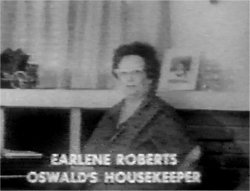 LEE
HARVEY OSWALD, DALLAS PART II,
SECTION
LEE
HARVEY OSWALD, DALLAS PART II,
SECTION
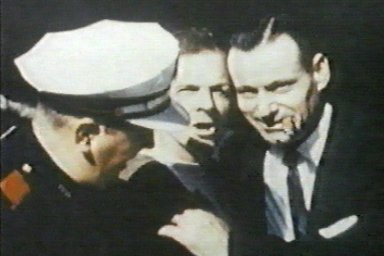
< Warren Report >
Earlene Roberts Oswald's Rooming
House. Nov 22 1963
She testified that at about 1 p.m. on November 22, after Oswald had returned to
the rooming house, a Dallas police car drove
slowly by the front of the 1026 North Beckley premises and stopped momentarily;
she said she heard its horn several times. Mrs. Roberts stated
that the occupants of the car were not known to her even though she had worked
for some policemen who would occasionally come by.
TEN MINUETS
LATER:
OFFICER TIPPIT SHOOTING,
TWO or THREE BLOCKS FROM JACK RUBY'S APARTMENT!
<HSCA 1979>
Mr. SAWYER. Well, did
you find out that Jack Ruby's apartment was about two or three blocks up the
street, also on the direct route he was going?
Mr. RANKIN. Yes.
The Warren Commission was incorrect in concluding that Oswald and Ruby
had no significant associations, and
its finding of no conspiracy was not reliable.
<END.>
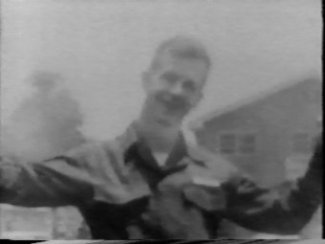 Lee Harvey Oswald interview Dallas police department. |
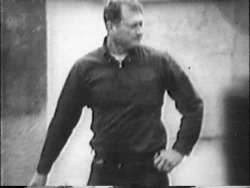 |
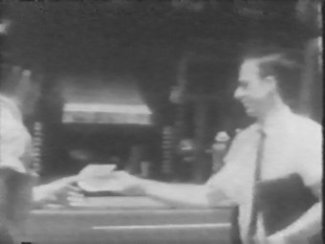 JFK Oswald Dallas police interview Kennedy |
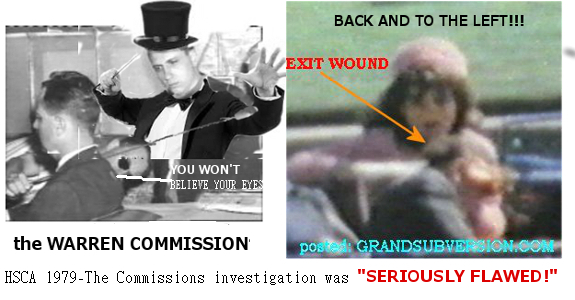
JFK KENNEDY ASSASSINATION:[
HOME ]![]() the
GRAND SUBVERSION.
the
GRAND SUBVERSION.
PAGE
(2) [
NEXT
]
![]() Lee Harvey Oswald Interview Interrogation Dallas
Police Department. Day 2.
Lee Harvey Oswald Interview Interrogation Dallas
Police Department. Day 2.
Dallas Police Sections
[Station-Headquarters]--[Dealey Plaza]--[Book Depository]--[Oswald Property
Search]--
[Oswald Interrogation]--[Oswald's Transfer and Shooting]
|
Grand Subversions JFK Assassination VIEW ALL SECTIONS -[ PHOTO LINK INDEX ] |
|
Lee Harvey Oswald PT-I PAGES 1 - 5 |
Lee Harvey Oswald PT-II PAGES 1 - 4 |
|
1
American, Marine, defector 2 Oswald in the U.S.S.R. 3 Returns, Attempt on Gen. Walker |
4
De Mohrenschildt, joins FPCC then
offers help to anti Castro groups 5 Arrested in New Orleans, Radio interview |
1
Lee Oswald and Jack Ruby's INTERESTS IN CUBA 2 CUBA the MOB the CIA and the Watergate Break-in 3 David Ferrie, Lee Oswald Connection 4 Oswald, Ferrie, Banister connection |
|
Lee Harvey Oswald PT-III PAGES 1 - 6 |
Lee Oswald PT-IV PAGES 1 - 9 |
|
1
Marina Oswald: his desire was to get to Cuba 2 Cuban Revolutionary Junta and Oswald 3 Oswald in Mexico City |
4
Mexico, CIA mix-up and the ROUTINE
DESTRUCTION of Oswald�s military intelligence file. 5 Return to dallas and the Oswald Ruby Connections? 6 Oswald Ruby Connections? |
1
Dallas FBI agent James P. Hosty searches for
Oswald 2 Was Oswald And Ruby FBI INFORMANTS 3 Oswald's KGB Connection? 4 Oswald Reported Sighting? |
5
Oswald OR Someone Else? 6 Oswald Reported Sighting? 7 Oswald OR Someone Else? 8 Oswald Reported Sighting? 9 THE BLACK HOLE OF SECRECY. |
| Dealey Plaza Witnesses PAGES 1 - 8 | The Great Escape PAGES 1 - 4 | ||||
 |
 |
 |
 |
 |
 |
|
1
Presidential Threats 2 wittiness in the motorcade 3 wittiness in the motorcade 4 Gordon Arnold was he there |
5
shots book dep / knoll
6 more plaza wittiness 7 more plaza wittiness 8 officers / Oswald encounter |
1
Oswald's Bus and Cab ride. 2 Oswald at boarding house, police car honks horn outside 3 THE SHOOTING OF OFFICER TIPPIT 4 The capture and arrest of Oswald. |
SECTIONS
[Dallas I]--[Dallas
II]--[Parkland Hospital]--[Bethesda
Autopsy]--[Shots]--[Magic
Single Bullet Theory]--[Oswald, Part
I -
II -
III -
IV -
Curtin Rod Story]--[Three
Tramps]--[Dallas
Police]
| grandsubversions.com NEW Grassy Knoll ENHANCEMENTS. | |||
| Moorman photo. | Black Dog Image. | Knoll Overview. | Gordon Arnold Factor. |
 |
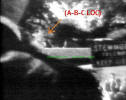 |
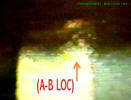 |
 |
| CLICK IMAGE FOR ENHANCEMENT PAGE. |
|
GRAND SUBVERSION ENHANCEMENTS BY BOB DRUK |
| Moorman Enhancement |
Some of the FACTS: CLICK IMAGE for the REST OF THE STORY. |
|
GRAND SUBVERSIONS EXTENSIVE LIST OF LINKS: |
| ►JFK Assassination U.S. Presidents | ►Assassinations in History | ►Human Services & Volunteer Groups |
| ►ALTERNATIVE NEWS | ►JOB'S EMPLOYMENT | ►MEDICAL - HEALTH |
| ►WATCHDOG GROUPS | ►NEWS RESOURCES | ►SEARCH ENGINES |
| ► | ► | ► |
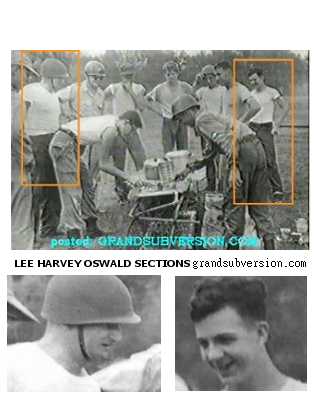
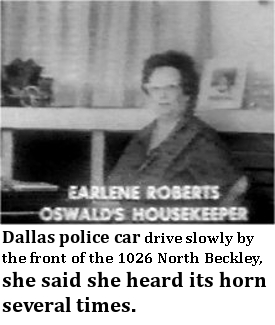
LEE HARVEY OSWALD SECTIONS JFK ASSASSINATION

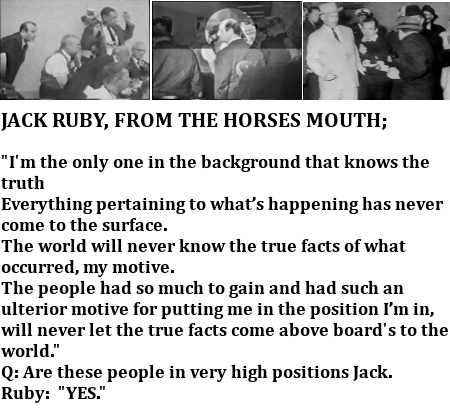
LEE HARVEY OSWALD JACK RUBY AND THE DALLAS
POLICE, WHAT A COMBO.
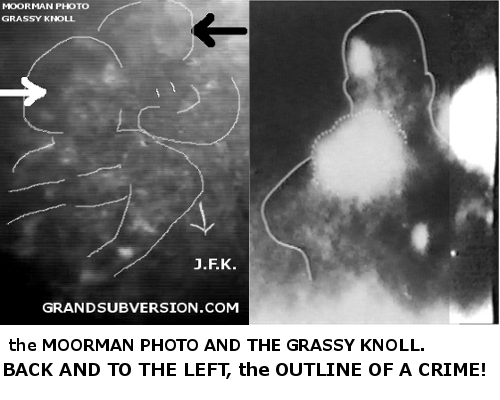
BADGE MAN JFK DALLAS POLICE SHOT PHOTO IMAGE WHO SHOT KILLED KENNEDY
KILLER ASSASSIN ASSASSINATION.
JFK ASSASSINATION PHOTOS AND THE
GRASSY KNOLL
PHOTOS.
PAGE
(2) [
NEXT
]
![]() Lee Harvey Oswald Interview Interrogation Dallas
Police Department. Day 2.
Lee Harvey Oswald Interview Interrogation Dallas
Police Department. Day 2.
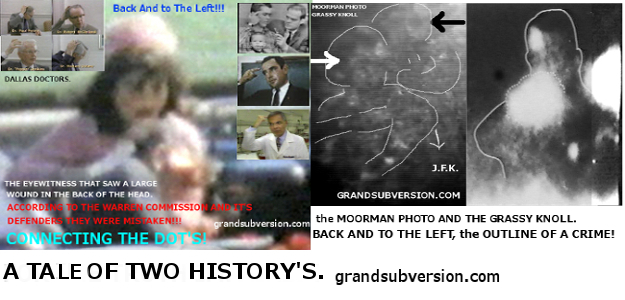
JFK ASSASSINATION CAR PHOTO PICTURES
JOHN F KENNEDY JACKIE AFTER.
JFK KENNEDY ASSASSINATION:[
HOME ]![]() the
GRAND SUBVERSION.
the
GRAND SUBVERSION.